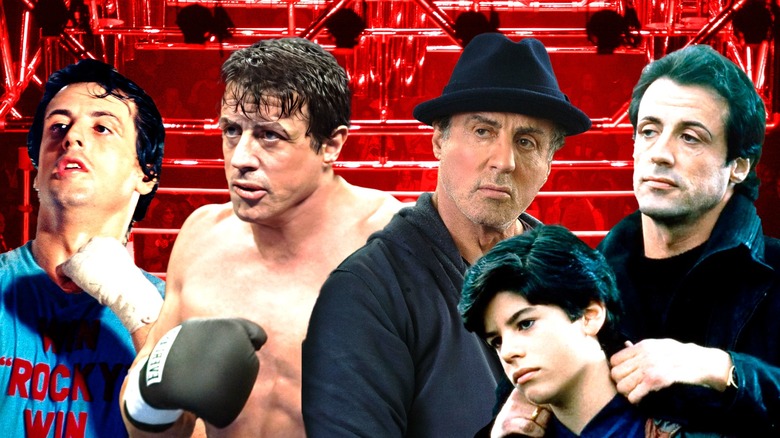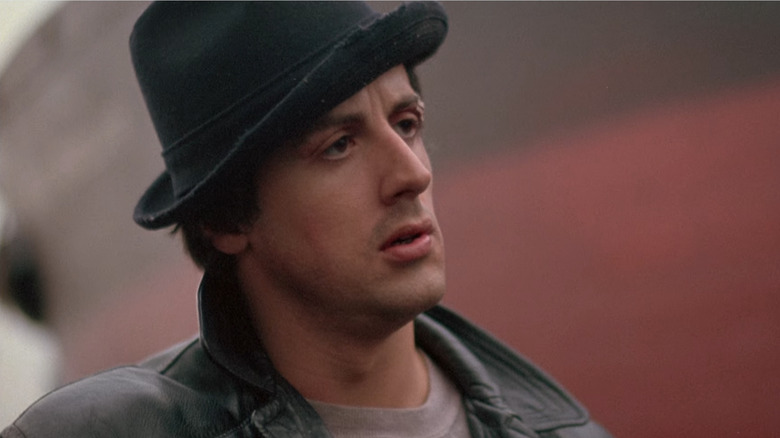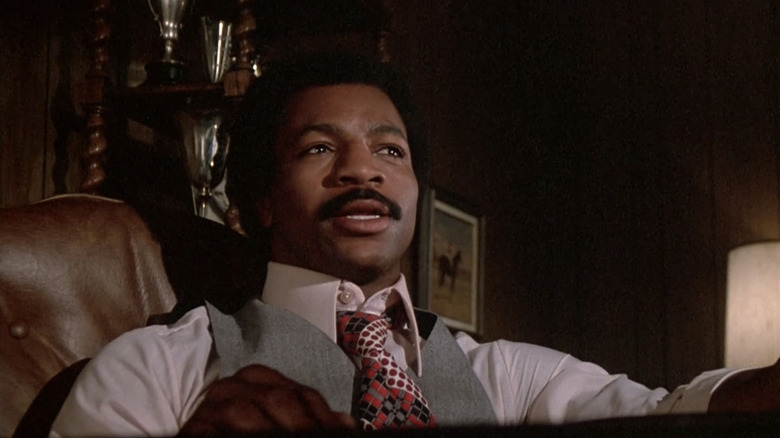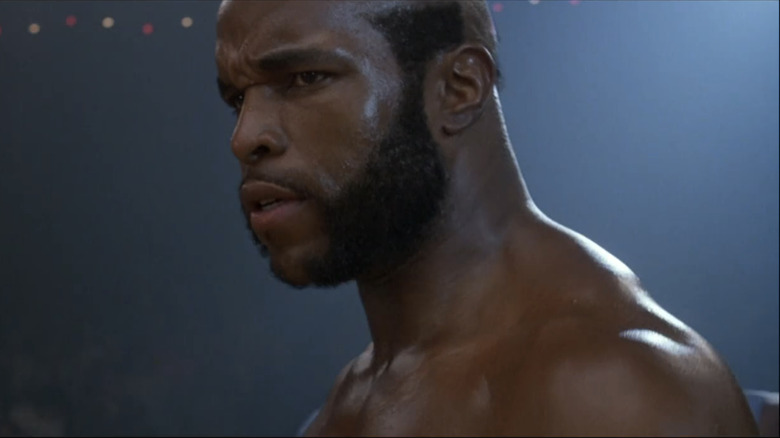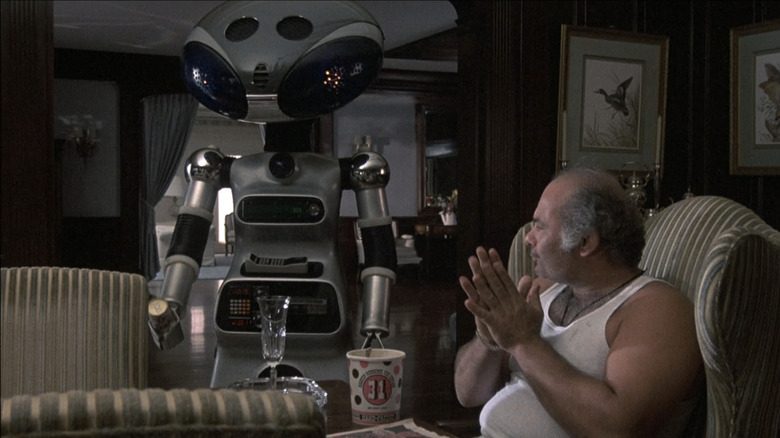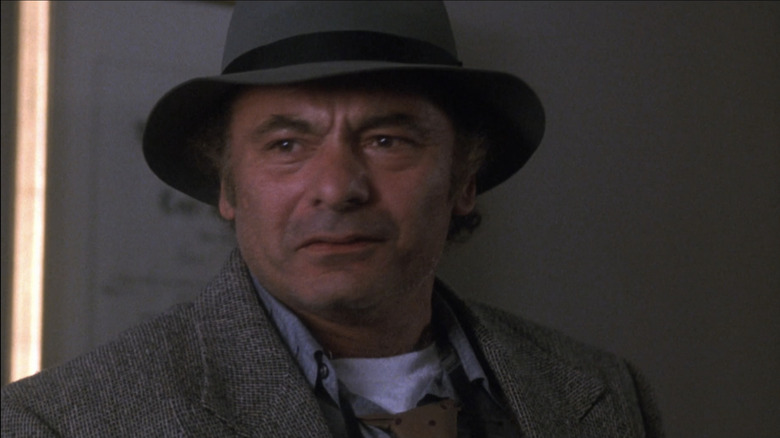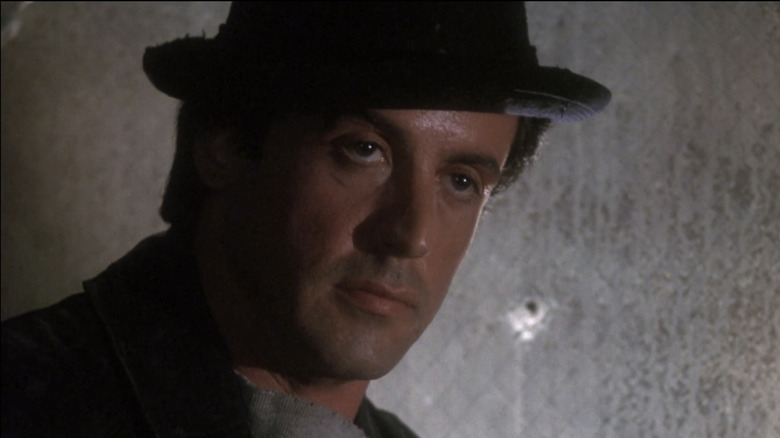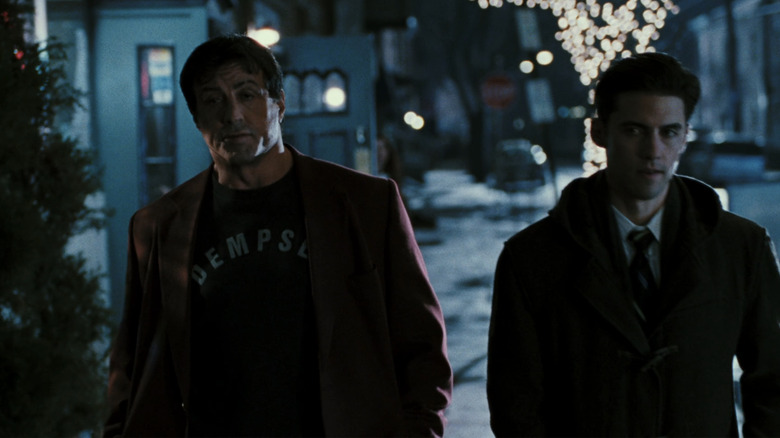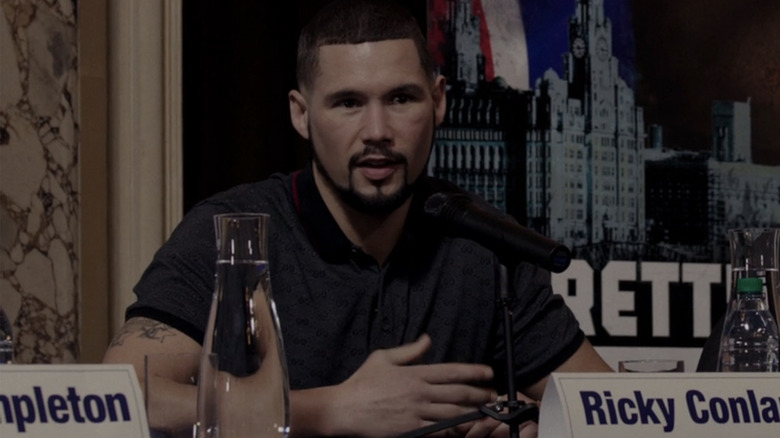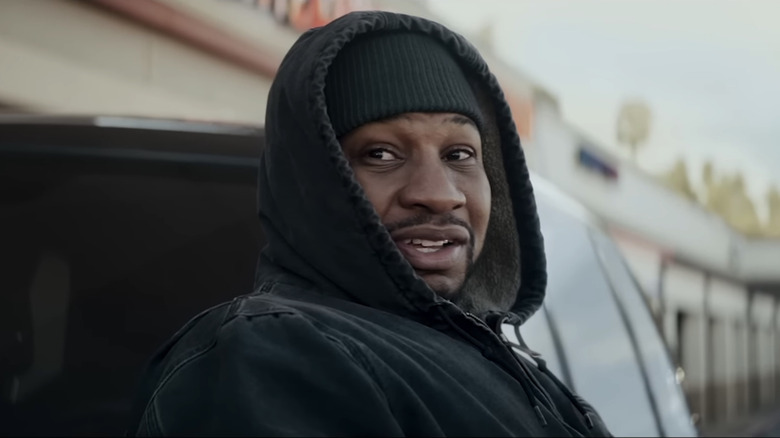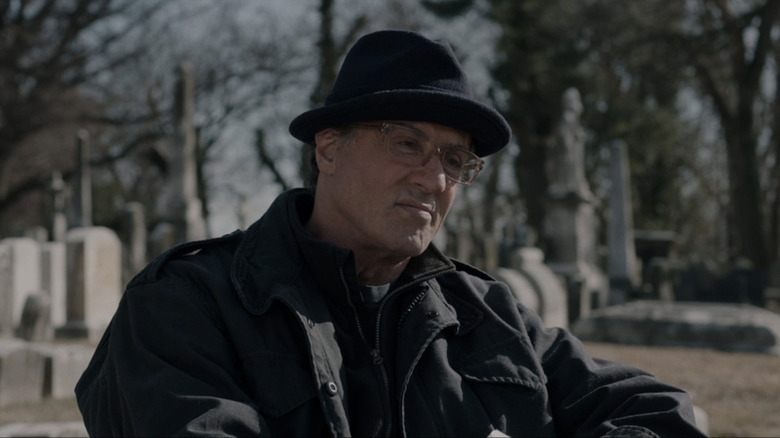Biggest Unanswered Questions In The Rocky Franchise
The nine (and counting) films of the "Rocky" franchise are relatively straightforward. Inspired by the 1975 fight between Muhammad Ali and New Jersey boxer Chuck Wepner, the very first 1976 movie stars Sylvester Stallone (who also wrote it, and would go on to direct most of the sequels) as Rocky Balboa, a Philly palooka plucked from obscurity to fight heavyweight champ Apollo Creed (Carl Weathers) in a bicentennial-themed novelty match. The surprise Best Picture winner was followed by decades of sequels charting the ups and downs of Rocky's life, from his unlikely victories and impossible comebacks in the face of defeat to his later years as a mentor to Apollo's son Adonis (Michael B. Jordan) in the spin-off "Creed" films.
The power and popularity of the series comes from the way each film plays like a fable. They're less interested in the intricacies and politics of boxing as a sport, and more invested in its inherent violence as a symbol for the human condition: We fight, we fall, we rise to fight again. Still, with nearly 10 films released across a half-century, the saga was bound to raise a few unanswered questions. Some are blank spots in a character's backstory; some come from the way the sequels don't always fit together to make a cohesive story; some come from whatever odd muse Stallone was chasing. Let's take a look at some of the biggest head-scratchers from the "Rocky" franchise.
Was Rocky a thumb-breaker?
Over the decades, the image of Rocky — impossibly buff, pulling cars through the snow, and fighting for the fate of the free world — has grown so delightfully cartoonish that it's easy to forget how relatively grounded and low-key the first film in the series is. "Rocky" is as much a working-class character study in the vein of Paddy Chayefsky's "Marty" as it is a proper sports movie. Yet even dedicated fans of the series lose track of just how much time the film spends with Rocky outside the ring. One element in particular that becomes obscured by the fog of memory is that when the film begins, Rocky is working between fights as a collector for neighborhood mobster Tony Gazzo (Joe Spinell).
An early scene shows him running down a dock worker who owes $200, with instructions from Gazzo to break the guy's thumbs. Rocky, a soft touch, takes the guy's cash but doesn't damage his digits, which earns him a dressing-down from Gazzo later on. Even at this early stage in the film, we know Rocky is both a bruiser and a sensitive soul, and the fact that he could have broken the dock worker's thumbs but chose not to is notable. But the film begins at what turns out to be the end of his mob career (other than a brief return to the life in "Rocky II"). It's entirely possible that in more desperate times — times when he wasn't coming off a win in the ring the night before, as he is here — Rocky was less forgiving to Gazzo's debtors. We'll never know for sure, but we can wonder.
Where are Apollo's other kids?
Apollo Creed's wife Mary-Anne (Phylicia Rashad) and his son Adonis are central characters in the "Creed" films, but in the "Rocky" movies, they occupy a much different space. Adonis, of course, is never seen before his eponymous 2015 film, having been born in the months after Apollo's death in "Rocky IV," but Mary-Anne is there from the beginning. Actress Lavelle Roby plays Apollo's wife in the first film, an uncredited role that essentially sees her act as a glorified extra. In "Rocky II," she is given a first name and played by Sylvia Meals. The character sits out "Rocky III" but returns for her biggest appearance to date in "Rocky IV," credited this time merely as "Mrs. Creed."
Mary-Anne is little more than a bystander in these films, but at least she's seen; her children are not so lucky. Apollo mentions his kids several times throughout the "Rocky" films, but we're never given any indication of how many there are, or what their names, ages, or other details might be. Even the "Creed" films, in which Mary-Anne rescues Apollo's illegitimate son Adonis from foster care in the 1990s, never mention Creed's presumably grown children in any significant way. In a key moment in "Creed III," Adonis claims that Apollo's two other kids were not welcoming to him during an argument with Mary-Anne. This stands as the first concrete information we've ever received about the other Creed children.
What happened to Clubber Lang?
One of the most remarkable things about Ryan Coogler's "Creed" is the way that he and co-screenwriter Aaron Covington crafted a thoughtful, serious film out of arguably the silliest "Rocky" movie: "Rocky IV." For 2018's "Creed II" Coogler and director Steven Caple, Jr. doubled down on the connections by having Adonis face Viktor Drago (Florian Munteanu), son of "Rocky IV" villain Ivan Drago (Dolph Lundgren). The film brings back both Lundgren and Brigitte Nielsen as ex-wife Ludmilla, and fills in some of the details of what happened to the characters after Drago's loss to Rocky.
The return of Drago (and Lundgren) got fans wondering if the "Creed" films would resurrect any other beloved franchise villains — most notably, Mr. T's Clubber Lang from "Rocky III." As of "Creed III" there has been no mention of Lang or any potential pugilistic offspring. However, that wasn't always the case. Back in 2010, several years after "Rocky Balboa" appeared to bring the franchise to a close, Stallone claimed that he had wanted to resurrect Clubber Lang for that film, casting him as a television commentator a la George Foreman, but Mr. T wanted too much money to return. Thus, Clubber's post-loss fate remains murky and untold. Stallone also revealed a much grimmer fate for Ivan Drago than the one seen years later in "Creed II." in his imagination, Drago was shunned by Soviet society after his defeat, turning to drugs and eventually dying by suicide.
If you or anyone you know is having suicidal thoughts, please call the National Suicide Prevention Lifeline by dialing 988 or by calling 1-800-273-TALK (8255).
What happened to Paulie's robot?
There are a lot of odd choices on display in "Rocky IV," which Stallone might have come to regret in the decades since it debuted. One of the most notorious is Sico the robot. Developed by International Robotics founder Robert Doornick, Sico was originally created in the 1970s as a tool for working with special needs children. The automaton appears in the film as a birthday present for Rocky's louse of a brother-in-law Paulie (Burt Young), who is initially horrified by the gift. "I wanted a sports car for my birthday," he protests, "not no walking trashcan!"
After a while, though, Paulie takes a shine to his new robotic companion, and then it's other people's turn to be horrified. When Apollo visits the Balboa home in a later scene, he watches agape as Sico, somehow reprogrammed to speak in a breathy female voice, blasts Kenny Loggins from its speakers and fetches beers while cooing compliments to its slobbish master. "That's my girl. She loves me," Paulie says by way of explanation, which only raises more troubling questions about the nature of their relationship. Sico has never been seen again in the franchise. Presumably, it's one of the assets stolen from the family at the start of "Rocky V," but we can't be sure. Now that Stallone has removed it entirely from his director's cut, the whole thing plays out even more like a Gen X fever dream.
Who would put Paulie in charge of their finances?
1990's "Rocky V" was the series' first attempt at a back-to-basics reboot. Picking up the story (as the "Rocky" films often do) right after the events of the previous movie, the Balboa family returns home from the Soviet Union to find that the family accountant, originally hired by brother-in-law Paulie, has made off with all of Rocky's money. Even worse, Rocky is diagnosed with brain damage from his brutal fight against Ivan Drago and is advised to retire, leaving the family with nowhere to go but back to their old Philly stomping grounds.
The subplot about the crooked accountant serves to return Rocky and Adrian (along with Rocky Jr., played here by Sage Stallone) to the run-down track house that Adrian and Paulie share in the first film. It also raises an important question: Why would Rocky and Adrian allow Paulie, of all people, to be in charge of their finances? From the very beginning, when he tries to leverage his sister's budding relationship with Rocky to get in good with Tony Gazzo, Paulie is nothing but a lout whose simmering rage towards his more successful brother-in-law boils over at the slightest provocation. Over the years, he shames his sister, displays a lot of ugly bigotry toward Apollo and nearly every other character of color in the series, and only barely earns his keep by occasionally working as one of Rocky's corner men. And while Young's performances as Paulie are always superb, it's unclear why Rocky and Adrian would keep such a toxic presence in their lives.
What about Rocky's brain damage?
The brain damage Rocky suffers at the hands of Ivan Drago in "Rocky IV" is the main narrative engine of "Rocky V." Since another fight could incapacitate or kill him, Rocky can't take any big payday fights to restore his family's fortune. So, he steps back from the ring and reopens the gym originally run by his late trainer Mickey (Burgess Meredith, who returns here as a ghostly vision). Soon, he takes a volatile young fighter named Tommy "Machine" Gunn (Tommy Morrison) under his wing, but, in a twist that gets echoed decades later in "Creed III," the protégé turns against the master. Rocky must once again defend his honor with his fists, even if it costs him his life.
16 years later, Stallone tried his second back-to-basics reboot with the generally much better "Rocky Balboa." Now settled comfortably in post-fight retirement, running a nice little Italian restaurant named after Adrian (who dies between films), Rocky gets the itch to box once again when an ESPN computer simulation sees him winning against current champ Mason "The Line" Dixon (real-life light heavyweight Antonio Tarver). The odds are once again stacked against him, but the focus is on his advanced age. When he announces his intention to return to the ring and face Dixon for real, no one — not his grown son Robert (Milo Ventimiglia), nor Paulie, nor even the Pennsylvania Athletic Commission — mentions his debilitating brain injury as a reason not to fight again. This could be an unintentional omission, but it very well might be a case of Stallone quietly writing "Rocky V" out of existence within his cinematic universe.
What happened between Rocky and his son?
"Rocky Balboa" begins with Rocky facing life as a lonely widower estranged from his son Robert. His only companion from the old days is Paulie, who has mellowed with age but is still largely useless and angry. Robert is no longer going by Rocky Jr., but he still lives in Philly with the last name Balboa, so when Rocky makes headlines by getting his boxing license reinstated, all the finance bros Robert works with get very excited. Robert is a different man from his father, book smart if not street smart — or, as Apollo Creed once put it, "a thinker, not a stinker." But when his father needs him in his corner (literally), Robert is there with his full support.
Though Robert and Rocky appear to be reconciled by the end of "Rocky Balboa," by 2018's "Creed II," the two are once again estranged. The bond between fathers and sons is present throughout the franchise, but in "Creed II," it takes center stage; Adonis wrestles with his loyalty to the memory of Apollo, the father he never knew, and Rocky, the father figure he always wanted, while becoming a father himself. The birth of a surrogate grandchild turns Rocky's thoughts to his own grandson, whom he has never met. It's unclear if some big falling-out took place between Rocky and Robert in the decade-plus since "Rocky Balboa," or if it's just the natural result of what appears to be Rocky's dogged inability to connect with his own son.
Who are the real boxers in the Rocky universe?
The boxing world of "Rocky" is very much apart from the real-life sport. Joe Frazier has a cameo in the first film, the great middleweight Roberto Duran is one of Rocky's sparring partners in "Rocky II," and Mike Tyson briefly appears as himself in "Rocky Balboa." Mostly, though, the films use outside figures like real-life commentators, ring announcers, and journalists to add authenticity to their often fantastical view of how boxing works. The "Creed" films, however, take a different tack, casting real-life fighters like Andre Ward and Tony Bellew as Adonis' in-ring opponents. "Creed III" boasts former light welterweight champ José Benevidez Jr. and current welterweight champ Terence Crawford in featured roles, along with a cameo from superstar Canelo Alvarez as himself.
But sometimes, the films' elements of fantasy and reality conflict with each other in interesting ways. Apollo Creed is clearly based on Muhammad Ali, and he occupies a very Ali-like place in the "Rocky" universe, as the greatest to ever fight and a monumental figure for Adonis to live up to. In "Creed III," however, a key moment between Adonis and former friend Dame Anderson (Jonathan Majors) revolves around a ticket to the real-life 1974 fight between Ali and George Foreman, better known as "The Rumble in the Jungle." Does this mean that Ali and Creed existed together in this universe? Likewise, a throwaway reference to Don King in the film calls into question the existence of George Washington Duke, a King parody portrayed by Richard Gant in "Rocky V." Were King and Duke, two flashy promoters fond of the phrase "only in America," operating at the same time?
What does Dame do now?
There's often a schoolyard mentality at work in the "Rocky" movies' depiction of boxing: Rocky or Adonis face a bigger, meaner bully, win the match because their heart is bigger and/or more pure, and the opponent, now humbled, retreats to the shadows, never to be seen again. The ending of "Creed III," in which Adonis comes out of retirement in order to defeat his childhood friend Dame and settle a decades-long beef — a beef that, honestly, Adonis is on the wrong side of — is a great example. After Adonis' explosive last-second victory, the two men share a quiet moment of reconciliation in Dame's dressing room. The beef is quashed, and Dame's seemingly revenge-driven desire to become heavyweight champion is apparently over.
This may serve as potent drama, but a boxing ring isn't a schoolyard; it's an office. Dame, no matter what his motivations were, is now not just a professional boxer, but a former (albeit very brief) unified heavyweight champion of the world, having beaten José Benavidez's Felix Chavez in a dirty, foul-ridden match earlier in the film. At the very least, a rematch between Adonis and Dame would be in consideration, or a rematch between Dame and Chavez. To its credit, the "Creed" series makes an effort to make its boxing landscape more realistic, with an elite collection of heavyweights — Adonis, Viktor Drago, Pretty Ricky Conlan (Tony Bellew) — circling each other over a period of years. If and when we see "Creed IV," Dame might very well join their ranks.
Where is Rocky?
The biggest unanswered question of "Creed III," and perhaps the biggest of the entire series so far, is a simple one: Where is Rocky? For the first time ever, Sylvester Stallone was not involved in a "Rocky" sequel as a writer, director, or star, though he does have a producer credit. In the first "Creed" film, Rocky is diagnosed with cancer, and the physical toll of his treatment mirrors Adonis' transformation from a showboating amateur to a top contender. "Creed III" notably doesn't confirm whether Rocky's absence is due to his death; in fact, it barely mentions the character at all. For such a sentimental series, especially when it comes to the bonds between men, the lack of emotion shown towards Rocky, wherever he is, is jarring.
According to Stallone, it was that lack of sentiment that led him to part ways with the series. In an interview with The Hollywood Reporter in November 2022, Stallone bemoaned what he saw as a darkness in the sequel that doesn't jibe with his storytelling instincts. Though "Creed III" does delve into Adonis' childhood trauma and features a chilling performance from Majors that ranks among the series' best, the film is not terribly different from Stallone's own sequels, borrowing elements from "Rocky III" and "Rocky V" and remixing them just as the previous "Creed" films do. A more reasonable explanation for Stallone's absence can be found in his increasingly public feud with "Rocky" producer Irwin Winkler, who has controlled the rights to the character since 1976. The fact that "Creed III" does not definitively kill Rocky off, however, suggests that there may still be a chance that Adonis and his mentor reunite down the line.
